Jailed Iranian Rapper Toomaj Salehi's Health Deteriorates
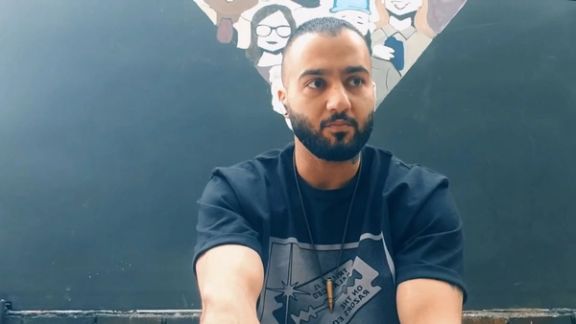
Toomaj Salehi, the Iranian rapper jailed for his protest music, is facing deteriorating health conditions and is in urgent need of medical attention.

Toomaj Salehi, the Iranian rapper jailed for his protest music, is facing deteriorating health conditions and is in urgent need of medical attention.
Salehi's official account reported on Tuesday that he has sustained injuries from torture during his time in detention, including severe swelling and bleeding in his eyes, a fractured tooth, and injured fingers.
The message further stated, "Now that his legal trial has concluded, he finds himself unjustly incarcerated, enduring days behind bars under intense pressure and control without basic prisoner rights. It is crucial to take swift action to secure his medical release and transfer to a hospital to address his urgent medical needs. Delays in addressing this critical matter must be avoided."
In July, Salehi dodged a death sentence and was instead sentenced to over six years in prison. He was convicted of offenses related to "corruption on earth," which includes violations of religious morality.
Following the tragic death of Mahsa Amini in police custody in September, Salehi was among the young Iranians who took to the streets to protest.
The security forces' crackdown on the protest movement led to the loss of almost 600 lives and the unlawful detention of nearly 20,000 individuals, according to activists. After sham trials, the judiciary imposed harsh sentences on protesters, including the death penalty.
Salehi, 33, is primarily known for his protest songs addressing social issues and government injustices in Iran. He was arrested on October 30th as part of a broader crackdown on opposition figures in response to mass uprisings across the country.
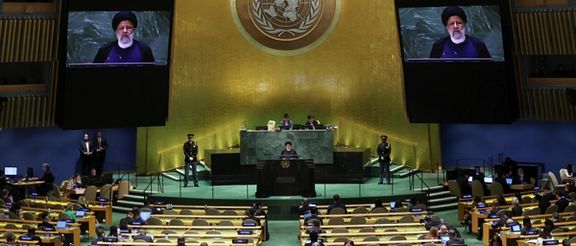
President Ebrahim Raisi blamed foreign countries for waging a propaganda campaign against the Islamic Republic in his UN General Assembly speech Tuesday.
He avoided the topic of the 2022 anti-regime protests almost entirely and referred to it only indirectly as the West’s worst media assault in history.
Raisi was speaking only a few days after the first anniversary of the killing of Mahsa Amini, which sparked widespread protests across Iran beginning in September 2022.
More than 500 were killed, 22 thousand arrested and at least 7 executed in the brutal crackdown that followed.
“The previous year was a year of victory for the Iranian people,” Raisi claimed brazenly, spinning last year’s events in Iran in the most spectacular fashion.
Images coming out of Iran last week, told a very different story: thousands of armed security forces and plain-clothes thugs had been stationed all over the capital Tehran, in anticipation of protests on the anniversary, intimidating passersby and preventing any gatherings in the streets.
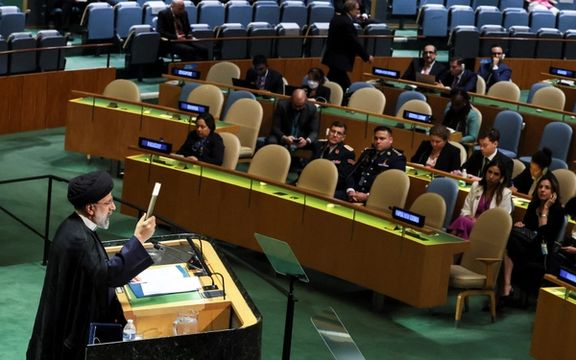
Raisi also lambasted the United States for ‘breaking a promise’ and leaving the JCPOA. He repeated the claim that Iran’s nuclear program is purely peaceful, despite accumulating well over 100 kilograms of uranium enriched to 60 percent.
"The Iranian nation prides itself on playing, thanks to the Islamic Revolution, the biggest role in unmasking the imperialists in the East and West," Raisi said, while the regime has supplied hundreds of kamikaze drones to Russia and exports more than million barrels of oil to China daily at discounted prices.
"The world is transitioning into a novel international order, and the project to Americanize the world has failed," he claimed.
Despite Iran's 12-year involvement in Syria's civil war and supply of weapons to Houthi forces in Yemen, Raisi said, “Our unambiguous position as the Islamic Republic: We do not stand nor support any war anywhere, not in Europe nor anywhere,”
On Monday, the UN nuclear chief said he had asked to meet Raisi on the sidelines of the General Assembly to try to reverse Iran’s decision to remove monitoring devices set up by IAEA and expel “a very sizable chunk” of the agency’s inspectors.
Rafael Grossi, Director of UN's International Atomic Energy Agency, warned that such measures make it impossible for IAEA to verify the nature of Iran's nuclear program.
Earlier on Tuesday, Iranian Americans opposed to the Islamic Republic held a rally ahead of Raisi’s appearance outside the UN headquarters in New York City.
The protesters had banners and posters portraying the Islamic regime's crimes in its 45-year history – including messages targeting Raisi and his role in those crimes.
Raisi was a member of the infamous Death Committee which oversaw summary execution of at least two thousand Iranian political prisoners in 1988.
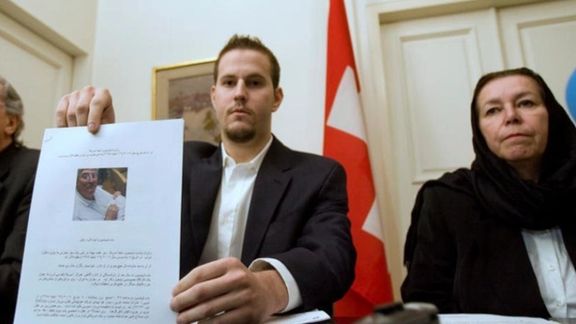
Families of Iran’s hostages not included in the US prisoner swap deal have called on Washington for an explanation on the fate of their loved ones.
The family of retired FBI agent Bob Levinson, who disappeared in Iran in 2007, and the daughter of Jamshid Sharmahd, who is on death row in Iran, issued separate statements after the regime freed five American citizens in exchange for $6 billion and five Iranians detained in the US. The other American resident that was not included in the deal was Shahb Dalili, an Iranian citizen with permanent residence status in the United States who remains imprisoned in Iran.
Dalili, a former captain of Iran Shipping Company and a US resident, was arrested during a trip to Tehran in 2016 for his father's funeral, after which he was apprehended by Iranian security forces. His family held several rounds of sit-ins outside the White House, the latest of which was in August. Darin Dalili, Shahab Dalili's son, has repeatedly pointed out the apparent contradiction with the Robert Levinson Law, which addresses the return of hostages, including US permanent residents. Highlighting a discrepancy between policy and practice, he underlined that despite this law, a green card holder remains imprisoned in Iran without clear resolution or intervention from US authorities.
Levinson, a former FBI agent, was taken prisoner by Iran’s intelligence apparatus while conducting an unauthorized freelance investigation on Kish Island, off Iran’s southern coast. Iranian officials have never explicitly acknowledged detaining Levinson, while US officials believe he was held as a possible bargaining chip.
During an interview with CBS in 2012, former President Mahmoud Ahmadinejad did not deny that Levinson was being held and implied there had been talks of a prisoner exchange. His family announced that he was presumed dead in March 2020, on the advice of US officials.
The Levinsons said in their statement, “We will never stop demanding that Iranian leaders answer for what happened to Robert Levinson, the greatest man we have ever known. His abduction on Iranian soil in March 2007, his years of imprisonment with a total lack of any human rights or decency, and ultimately his murder, are on their hands.”
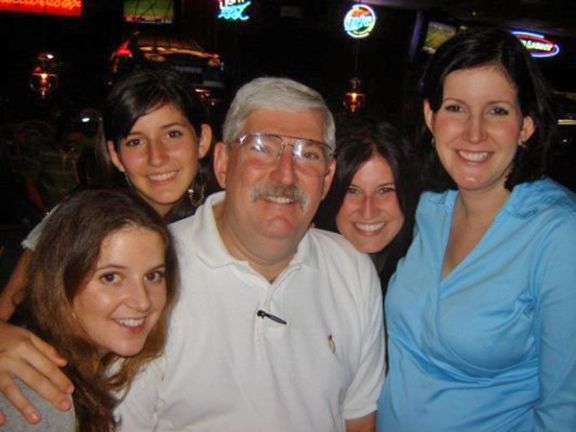
They described the release of the Americans as part of the new deal as “good news,” saying, “Today is a great day because American hostages unjustly held by the government of Iran have been returned to their families... But make no mistake: Today’s good news does not end our family’s nightmare and ongoing pain. Nor does it mask or excuse the shameful cruelty and unending lies of the Iranian regime.”
They also expressed gratitude to the Biden Administration for sanctioning former President Mahmoud Ahmadinejad and Iran’s Ministry of Intelligence (MOIS) "for their involvement in the constant promotion of lies about Robert Levinson’s whereabouts that still persist to this day.”
Immediately after the release of the hostages – at least three of whom are Iranian-Americans -- President Joe Biden announced fresh sanctions on the hardline former Iranian president and the country’s notorious intelligence ministry over the still undetermined fate of Levinson.
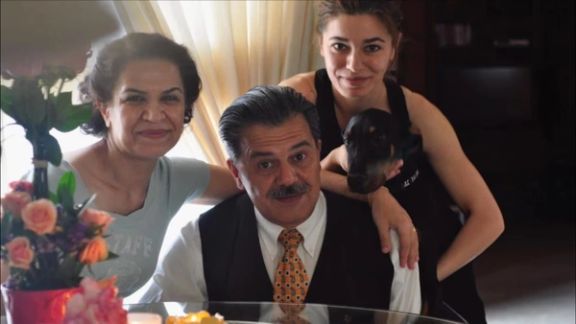
Sharmahd, who holds German and Iranian citizenship and is a US permanent resident, was abducted by Iranian agents in Dubai in 2020, smuggled to Iran, and sentenced to death in February. He was convicted of heading a pro-monarchist group named Tondar accused of a deadly bombing incident that occurred in 2008 at a religious center in Shiraz, killing 14 and injuring 215 more.
Having actively sought US officials' attention through sit-in protests outside the State Department to advocate for her father's case to no avail, Sharmahd's daughter, Gazelle, urged Biden – and German Chancellor Olaf Scholz -- to explain how they are going to ensure her father "will be safe and alive and not murdered."
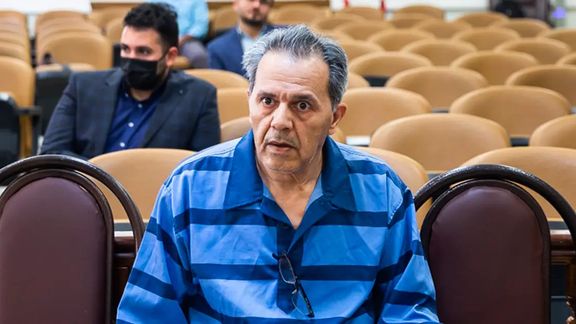
"The last American patriot left behind in a hostage release in 2015 was Bob Levinson, and we all know that cost him his life,” she stated. “At this point, President Biden and Chancellor Scholz owe our family an explanation of how they will redouble their efforts to make sure this horrific hostage-abandonment deal will not cost my dad his life and get him out of the torture chamber to rejoin our family, and what do they plan to do about this in weeks, not months or years."
Referring to her father’s death sentence, Gazelle said her father “was left behind to die.”
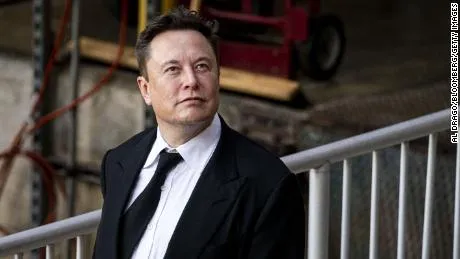
Elon Musk has revealed the regime's dissatisfaction with the launch of Starlink internet services in the country, satellites smuggled into the country amid widespread internet shutdowns.
Musk, who owns SpaceX and the Starlink satellite internet service, shared a letter from the regime's leadership during his meeting with the Israeli Prime Minister in California on Monday.
During their one-on-one conversation, the American tycoon said it happened at the time when Starlink satellite internet was connected in Iran in a bid to give widespread internet access to the millions affected by state shutdowns.
After the nationwide protests began in Iran last year, triggered by the death of Mahsa Amini in detention, the Iranian government severely restricted internet access for its citizens. In response to the restrictions, which included complete and periodic internet shutdowns and slowing down internet speeds, the US government lifted some restrictions on exporting internet services to Iran, allowing SpaceX to provide satellite internet services in Iran.
In response to the support from US authorities for activating satellite internet in Iran, the spokesperson for the Iranian Ministry of Foreign Affairs called the action a "violation of Iran's sovereignty" and threatened that such "efforts will not go unanswered."
However, Iran had not previously disclosed it had gone directly to Elon Musk himself to cut off Starlink services. The move was ignored, and after a year, there is still no news of Starlink being cut off in Iran.
In December, the head of the Union of Communication and Telecommunications Devices in Tehran confirmed the entry of 800 Starlink internet receiver devices into Iran and spoke of the "significant growth in the potential use of the devices" in the future.
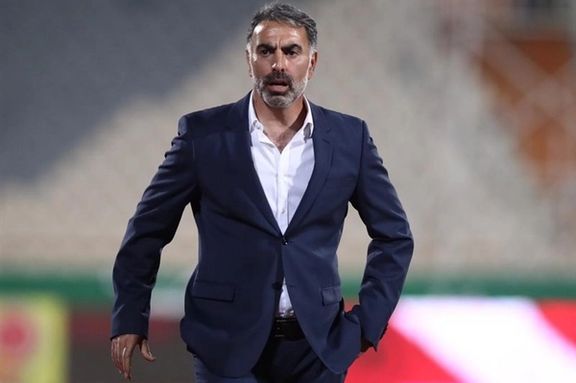
An Iranian football coach has expressed criticism regarding sport censorship in Iran after coverage of a female referee raising the hand of a male wrestler was banned from TV.
Mahmoud Fekri, who serves as the head coach of Havadar football club, voiced his concerns on Tuesday, noting the scene's ban from state TV.
The incident occurred at the Belgrade Wrestling World Championships, during which a female referee raised the hand of Iranian wrestler Hassan Yazdani.
Iran's state TV is tightly controlled by the office of Iran's authoritarian leader, Ali Khamenei, and has been experiencing a decline in viewership due to its extensive religious programming and heavy-handed censorship of news. Critics argue that it serves primarily as a propaganda tool, benefiting from significant government subsidies without any accountability.
Athletes have come under fire in the last year for supporting protests. Those who have spoken out have undergone social media bans, bank account freezes and even pay cuts. Those who have competed without hijab on the world stage have either been forced into exile or arrested and dealt severe legal consequences.
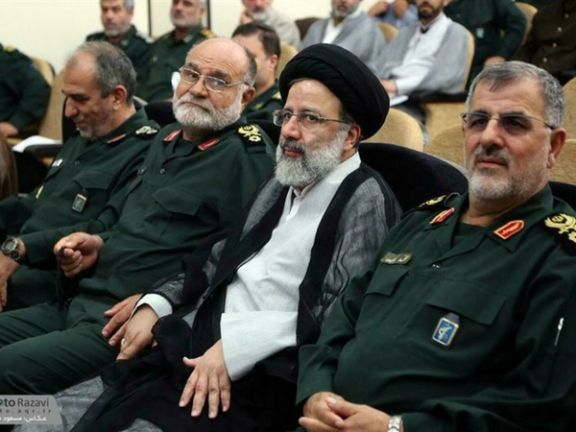
The Council on Foreign relations has changed an earlier announcement of cancelling a meeting with Iranian President Ebrahim Raisi in New York, and re-scheduled it to Wednesday.
Iran International’s correspondent Arash Alaei earlier reported from outside the CFR offices in New York City that representatives of the organization told reporters gathered there that a private meeting with Raisi and invited guests had been canceled.
However, later in the day, CFR said that the meeting will take place on Wednesday at the request of the Iranian team, at Raisi's hotel, the Hilton Millennium at UN Plaza, at 11 am. The hotel is located at a cordoned-off area, as protest gatherings had been planned outside the original venue, the CFR building.
On September 9, Roya Hakakian, a CFR member and an Iranian-born writer and activist revealed that she had received an invitation to attend the meeting but had declined. In her response to CFR, she cited that the Iranian president stands accused of serious human rights violations, particularly having been a member of a secret “death commission” that ordered the killing of up to 5,000 political prisoners in 1988.
“Dialogue is reserved for those with whom we have disagreements. For criminals like Raisi, the only venue for conversation must be a court of law,” Hakakian wrote to CFR.
But Hakakian and many other Iranian Americans were furious not just for Raisi’s culpability in one crime in 1988, but also for his role and responsibility as President during the Women, Life, Freedom protests that rocked Iran after Mahsa Amini’s death in hijab police custody last year.
Another prominent Iranian dissident figure, Nazanin Boniadi, also posted on X Tuesday that she was also invited but declined.
“Democratic institutions hold the key to tipping the balance of power in favor of those risking everything for freedom. If you afford your members the opportunity to meet dictators behind closed doors, then at least offer them the chance to also hear from their opponents in the open,” she said in her post.






